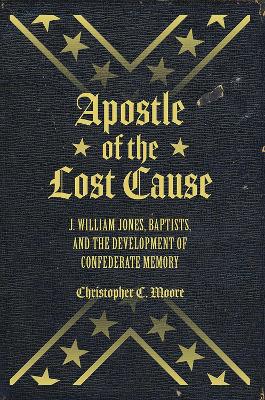America's Baptists
1 total work
Perhaps no person exerted more influence on postwar white Southern memory than former Confederate chaplain and Baptist minister J. William Jones. Christopher C. Moore's Apostle of the Lost Cause is the first full-length work to examine the complex contributions to Lost Cause ideology of this well-known but surprisingly understudied figure. Commissioned by Robert E. Lee himself to preserve an accurate account of the Confederacy, Jones responded by welding hagiography and denominationalism to create, in effect, a sacred history of the Southern cause.
In a series of popular books and in his work as secretary of the Southern Historical Society Papers, Jones's mission became the canonization of Confederate saints, most notably Lee, Stonewall Jackson, and Jefferson Davis, for a postwar generation and the contrivance of a full-blown myth of Southern virtue-in-defeat that deeply affected historiography for decades to come. While personally committed to Baptist identity, Jones supplied his readers with embodiments of Southern morality who transcended denominational boundaries and enabled white Southerners to locate their champions (and themselves) in a quasi-biblical narrative that ensured ultimate vindication for the Southern cause.
In a time when Confederate monuments and the enduring effects of white supremacy are in the daily headlines, an examination of this key figure in the creation of the Lost Cause legacy could not be more relevant.
In a series of popular books and in his work as secretary of the Southern Historical Society Papers, Jones's mission became the canonization of Confederate saints, most notably Lee, Stonewall Jackson, and Jefferson Davis, for a postwar generation and the contrivance of a full-blown myth of Southern virtue-in-defeat that deeply affected historiography for decades to come. While personally committed to Baptist identity, Jones supplied his readers with embodiments of Southern morality who transcended denominational boundaries and enabled white Southerners to locate their champions (and themselves) in a quasi-biblical narrative that ensured ultimate vindication for the Southern cause.
In a time when Confederate monuments and the enduring effects of white supremacy are in the daily headlines, an examination of this key figure in the creation of the Lost Cause legacy could not be more relevant.
